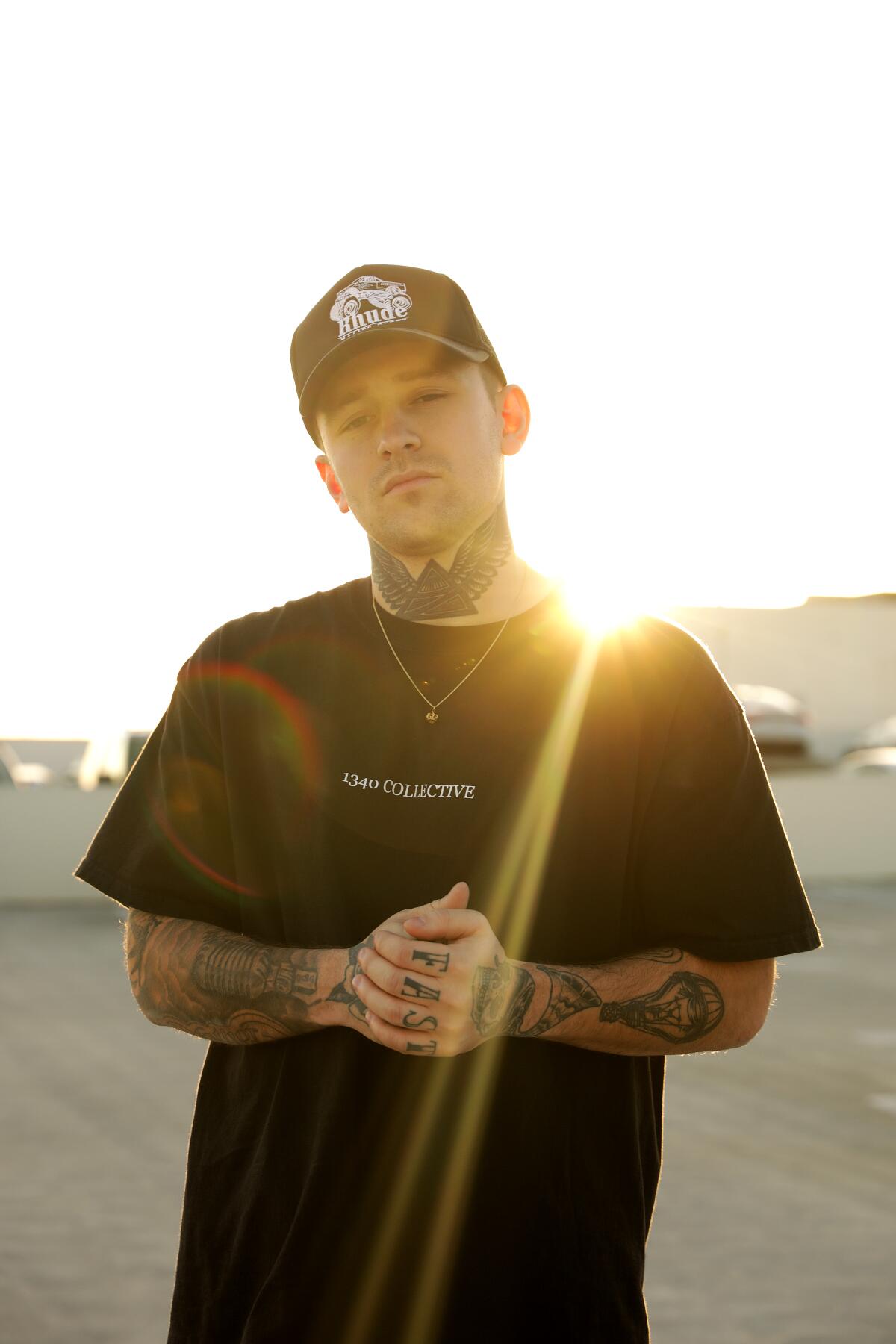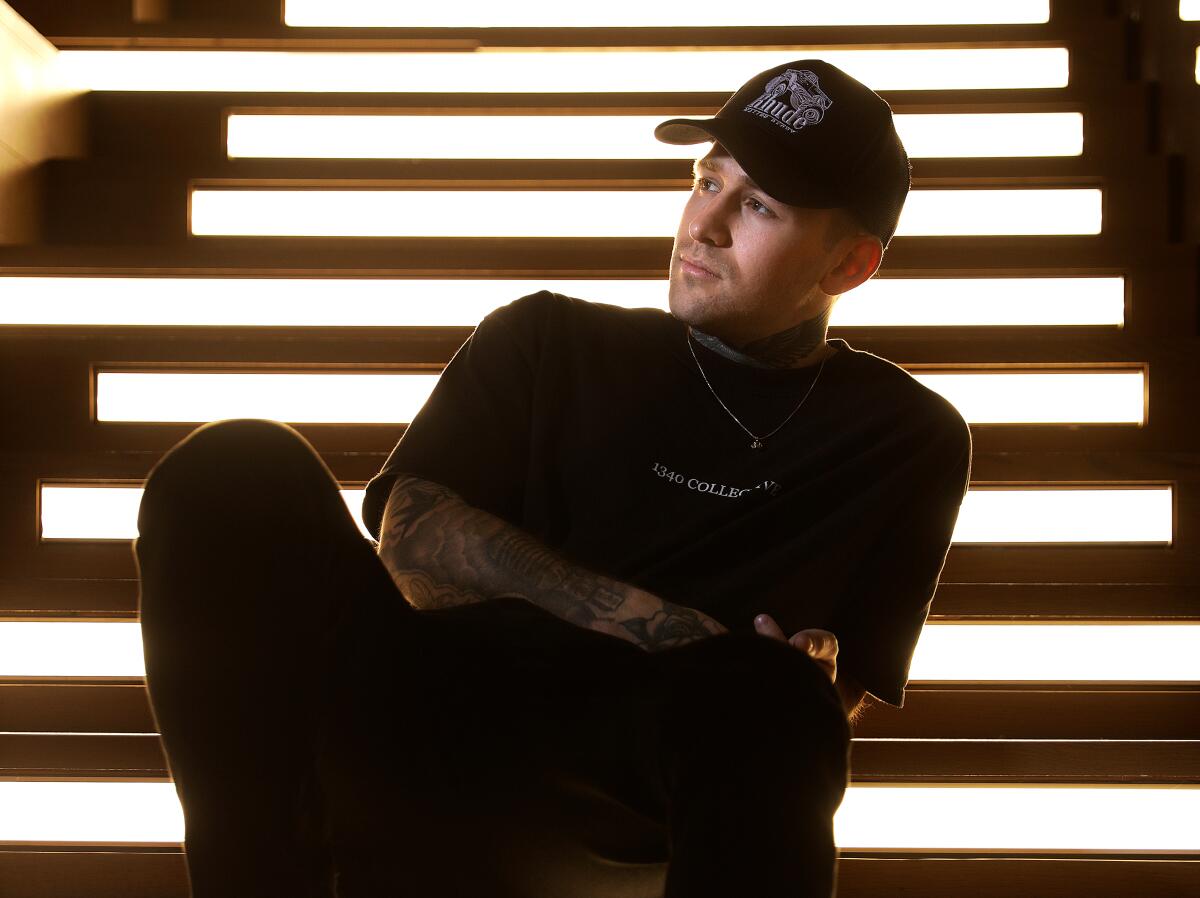What’s a hit song worth these days? For ‘Roxanne’ rapper Arizona Zervas, the answer ends in lots of zeroes

- Share via
Arizona Zervas sprawled on a sofa at Columbia Records’ offices in Culver City, the sun slowly sinking into the ocean through the picture window behind him. Dressed in black jeans, a black T-shirt and a black trucker hat, the 24-year-old rapper and singer responsible for the viral smash “Roxanne” lifted his cap and grinned, cat-that-got-the-cream-style, as he considered a question about his ability to deliver on his promise.
Zervas grew up poor-ish in Maryland; “riffraff” was the word he used to describe himself before he was kicked out of middle school for making trouble. But last year, “Roxanne” — a bubbly yet laid-back ode to a young woman obsessed with “cocaine and Whole Foods” — made him the object of an intense major-label bidding war that Columbia won when it struck a multimillion dollar deal.
Now the record company, eager to match its success with an earlier viral hit in Lil Nas X’s chart-dominating “Old Town Road,” is looking for a return on its considerable investment. So does Zervas, whose song has racked up more than half a billion plays on Spotify (and millions more on YouTube, Apple Music and SoundCloud), have any more like “Roxanne” up his sleeve? He lowered his hat back onto his head.
“I mean, I couldn’t put a number on it,” he said in his first extended interview. “But yeah — I got a bunch.”

In fact, Columbia may be OK with just the one. You can look at Zervas’ signing as proof of the label’s long-term belief in an artist who’s been releasing songs — slickly melodic tracks that, like “Roxanne,” blur the edges between pop and hip-hop — on the internet for years. But Columbia’s payout also reflects the economics of the new streaming business, in which a label makes money each time a monster hit is played (in contrast with the days of downloads and physical product, when the monetizable transaction was the one-time purchase of a CD or MP3).
And make no mistake — “Roxanne” is a monster. After an “incredible” reaction to the song’s appearance on an up-and-comer’s playlist, said Spotify co-head of music Jeremy Erlich, the platform quickly put “Roxanne” on its closely followed “Today’s Top Hits” playlist, where the song remains nearly five months after it came out. On Billboard’s Hot 100, which incorporates radio and video play, “Roxanne” has been lodged inside the top 10 for nearly as long.
As Lenny Beer, editor in chief of the music-industry trade journal Hits, put it: “Hits are worth more now than they’ve ever been worth before. And they continue to earn forever.” Which means that Columbia Chairman and CEO Ron Perry — an expert at milking a song’s value, as “Old Town Road” and its many remixes demonstrated — probably isn’t losing any sleep about having overspent on Zervas.
“From the moment I met him,” Perry said, “it was obvious that his vision is precise, his art is uncompromising and his songwriting is among the best I’ve ever seen.”
Zervas, of course, would prefer to think that “Roxanne” — which initially took off, like other recent viral tracks including Roddy Ricch’s “The Box,” on the video-sharing app TikTok — is merely the first of many big songs to come. Since he and producer 94skrt recorded the tune last summer, he said with a shrug, “I’ve had way more special feelings making songs than I did that day.”

Born in Providence, R.I., Zervas bounced around the East Coast with his family — mother, father, brother, sister — before ending up in Maryland, where he said playing sports took him out of his early troublemaking ways. He started making music in high school, writing rap verses over existing songs or beats he’d find for free online; positive feedback from friends drove him to keep at it, while artists like Mac Miller, from nearby Pittsburgh, convinced him he could build an audience through social media.
Not long after high school, he said, he was bringing in $1,000 a month from YouTube ads on his music, thanks in part to the attention he received from a widely shared video he posted during the 2016 Super Bowl in which he used the name of every NFL team in a rap that recalled Eminem.
This was around the time Zervas moved to Los Angeles to professionalize his operation; he hooked up with a manager, Quentin Gatto, and began putting his songs on Spotify, with its millions of users predisposed to anything that sounds vaguely like Drake or Post Malone (to name two of Zervas’ clear predecessors). Though he insists he’s not the most outgoing person, he also started making the scene here: “Roxanne,” he explained, was inspired by some of the women he’s met at the cozy bar atop the Roxy in West Hollywood.
“Oh, wait,” he added, seeming to think better of exposing his favorite spot. “I hope you don’t put that in the article.”

As soon as he wrote it, Zervas had a sense that “Roxanne” — which he wanted to strike an upbeat tone at a moment when hip-hop is heavy on gloom — would connect with listeners. “I knew it was an actionable song that people could dance to,” he said — one indication of a businessman’s instinct he said he inherited from his dad, who ran a diner and was “always hustling.”
Indeed, as the song blew up — and eventually sparked the label frenzy that he said fulfilled all the classic record-biz clichés — Zervas dialed back his presence online, determined to “let the song speak for itself,” he said. He posted only occasionally; he expressed zero interest in rolling out new versions of “Roxanne” à la “Old Town Road.” (He did allow one remix, featuring Swae Lee of Rae Sremmurd, which came out last month.) Zervas said he’d only agreed to this interview because “if I don’t tell people what I’m about then they’ll kind of make up their own story about me” — including, one presumes, the detailed conspiracy theories floating around YouTube that depict Zervas as an industry creation.
What’s he spent Columbia’s money on? “I bought, like, a new microphone, bro,” he said, adding that fancy cars don’t do much for him. He’s also paid some of his mom’s bills.
Looking to the future, he’s excited to release more singles — “soon,” he said, declining to elaborate — that show off what else he can do; an old-fashioned album, he added, doesn’t feel especially important in light of the interest he managed to drum up with just one song. But he also wants to develop his live act, and to enjoy the spoils of his success so far. Last month he played his first L.A. concert at the Echo: a rowdy, sold-out affair in which a crowd of several hundred kids cheered as a friend of Zervas’ bounded onstage and downed a beer in seconds flat.
“That was my boy Steve,” he said with a laugh a couple of days after the show. “I was looking for a beer to ‘cheers’ somebody in the crowd, and he just happened to have two in his hands.”
More to Read
The biggest entertainment stories
Get our big stories about Hollywood, film, television, music, arts, culture and more right in your inbox as soon as they publish.
You may occasionally receive promotional content from the Los Angeles Times.








